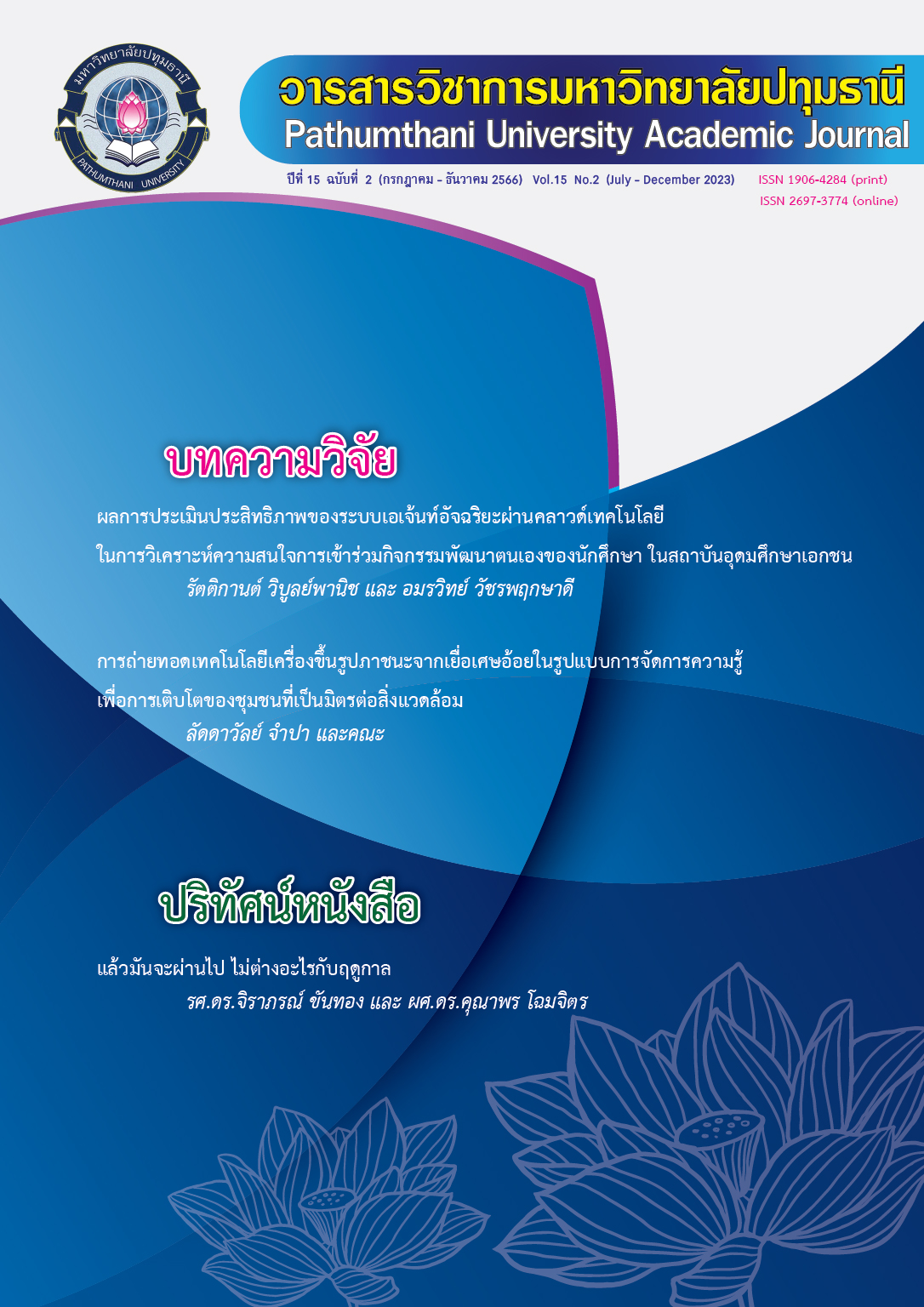ACHIEVEMENT OF USING ENGLISH SONGS FOR ENHANCING ENGLISH VOCABULARY KNOWLEDGE AND LISTENING STRATEGIES OF ENGLISH AS A FOREIGN LANGUAGE SECOND-YEAR STUDENTS MAJORING IN ENGLISH FOR COMMUNICATION AT A PUBLIC UNIVERSITY IN THE LOWER SOUTHERN REGION OF THAILAND
Keywords:
Achievement, Listening Strategies , English SongsAbstract
The study aims to: 1) examine the achievement of using English songs for enhancing English vocabulary knowledge of English as a foreign language (EFL) second-year students majoring in English for Communication at a public university in the lower southern region of Thailand, and 2) to study the learning strategies of vocabulary through listening to English songs of the students. 48 second-year students majoring in English for Communication at a public university in the lower southern region of Thailand were purposively selected as the participants of the study. 5out of 48 who possessed the highest scores of post-tests were interviewed to seek the listening strategies. The instruments used to collect data were pretest, posttest, and semi-structured interviews. Data were analyzed by mean ( ), percentage (%), standard deviation (S.D.), and t-test for dependent samples.
The research findings indicate that: 1) The posttest results show a significant improvement in English vocabulary compared to the pretest results at a statistical level of 0.05; 2) The most effective strategy for learning vocabulary from songs is to use English subtitles while watching music videos, followed by noting unfamiliar words. In conclusion, the use of songs to develop English vocabulary knowledge has a positive impact on the students, enabling them to apply their knowledge for educational purposes and daily life.
References
Eiamwat, P. (2017). “Using English song activity set "Every Conversation" with vocational certificate level 2 students”. Research Report. Bangkok: Rajadamnern Institute of Technology.
Finocchiaro, M. (1973). English language skills. New York: Simon and Schuster.
Griffee, Dale T. (1992). Songs in action. New York: Prentice Hall International.
Hamouda, A. (2012). “Listening comprehension problems-Vvoices from the classroom”. Language in India. Vol 12. No.8. pp.1-49.
Kaonon, W. (2017). Developing English communication skills of fourth grade elementary school students using situational learning approach. Master's thesis, Program in Curriculum and Instruction. Dhurakij Pundit University.
Kasuwan, M. (2013). The Effectiveness of English song activities on vocabulary learning, speaking skills, and language proficiency. Master's thesis, Program in Teaching English as an International Language. Prince of Songkla University.
Kulawanich, P. (2006). Basic information on educational management and foreign language requirements in Thailand. Chulalongkorn University: Bangkok.
Mc Donald, D. (1984). Singing can break the conversation barrier. English teaching Forum volume.
Promsit, P & et al. (2021). “Effectiveness of English music activities on learning and retention of vocabulary and speaking ability of Prathomsuksa 5th at Ban Rakai School, Muang District, Nakhonratchasima province”. Journal of Roi Kaensarn Academi, Vol. 6 No. 12. pp. 224-238.
Quest, V. (1999). “The effect of music on acquiring vocabulary with the technically gifted students”. Gifted Education International. Vol 14. No.1. pp. 12-21.
Rukyu, R. (2016). English listening skills and comprehension of Thai students learning English as a foreign language: A case study of military educational institutions in the central region. Master's thesis, Program in English for Communication. Burapha University.
Sangchai, D. (1990). Teaching English at the elementary level. Bangkok: Odean Store.
Downloads
Published
How to Cite
Issue
Section
License
Copyright (c) 2023 Jirayu Songkhro

This work is licensed under a Creative Commons Attribution-NonCommercial-NoDerivatives 4.0 International License.
บทความที่ได้รับการตีพิมพ์เป็นลิขสิทธิ์ของวารสารมหาวิทยาลัยปทุมธานี
ข้อความที่ปรากฎในบทความแต่ละเรื่อง เป็นความคิดเห็นส่วนตัวของผู้เขียน กองบรรณาธิการไม่จำเป็นต้องเห็นด้วยเสมอไป และไม่มีส่วนรับผิดชอบใด ๆ ถือเป็นความรับผิดชอบของผู้เขียนแต่เพียงผู้เดียว



